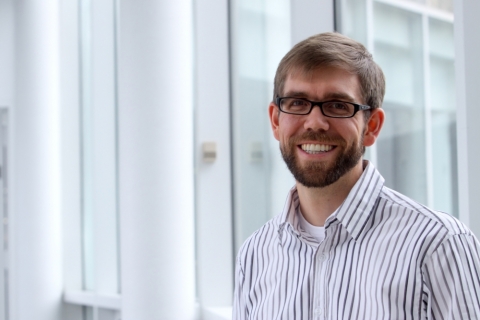
Date:
Location:
Speaker:
Abstract:
Imagine a world in which we could adapt biology to manufacture any therapeutic, material, or chemical from renewable resources, both quickly and on demand. Industrial biotechnology is one of the most attractive approaches for addressing this need, particularly when large-scale chemical synthesis is untenable. Unfortunately, current approaches to engineering organisms remain costly and slow. This is because cells themselves impose limitations on biobased product synthesis. It is difficult to balance intracellular fluxes to optimally satisfy a very active synthetic pathway while the machinery of the cell is functioning to maintain reproductive viability. Further, chemical reactions take place behind a selective barrier, the cell wall, which limits sample acquisition, monitoring, and direct control. In addition, cells are adapted to a relatively simple chemical operating system (i.e., a few common sugars, 20 amino acids), which presents researchers a limited set of accessible molecules with which to work. In this presentation, I will discuss my group's efforts to overcome these limitations and widen the aperture of the traditional model of biotechnology. In one direction, we seek to create a new paradigm for engineering biocatalytic systems using cell-free biology. In another area, we are catalyzing new directions to repurpose the translation apparatus for synthetic biology. Our new paradigms for biochemical engineering are enabling a deeper understanding of why nature’s designs work the way they do, as well as opening the way to novel biobased products that have been impractical, if not impossible, to produce by other means.
Bio:
Michael Jewett is an Associate Professor of Chemical and Biological Engineering and co-director of the Center for Synthetic Biology at Northwestern University. He received his PhD in 2005 from Stanford University. After completing postdoctoral studies as an NSF International Research Fellow at the Center for Microbial Biotechnology in Denmark and as an NIH Pathway to Independence Fellow at the Harvard Medical School, he joined Northwestern in 2009. Dr. Jewett’s lab seeks to re-conceptualize the way we engineer complex biological systems for compelling applications in medicine, materials, and energy by transforming biochemical engineering with synthetic biology. Dr. Jewett is the recipient of the NIH Pathway to Independence Award in 2009, David and Lucile Packard Fellowship in Science and Engineering in 2011, the DARPA Young Faculty Award in 2011, the Agilent Early Career Professor Award in 2011, the 3M non-tenured faculty grant in 2012, the Camille-Dreyfus Teacher-Scholar Award in 2015, and the ACS Biochemical Technologies Division Young Investigator Award in 2017.



